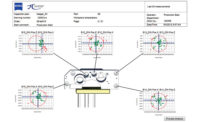Joseph De Feo, Juran Institute’s CEO, and 20-year employee, states that, “Dr. Juran recently told me that he wanted everyone to know he had a wonderful life and hoped that his contributions to improving the quality of our society will be remembered. Although Dr. Juran has been retired from the Institute since 1995, he remained Chairman Emeritus and ensured that we could carry on his mission to improve the quality of our society. He was even still working hard at completing another textbook, caring for himself and his wife of 81 years, Sadie, when he passed away.”
Dr. Juran had many notable accomplishments in his life. His major contribution to society was in the field of quality management. Perhaps most importantly, he is recognized as the person who added the managerial dimension to quality-broadening it from its statistical origins.
In 1937, Dr. Juran coined the Pareto Principle, which millions of managers rely on to help separate the “vital few” from the “useful many” in their activities. He also wrote the first standard reference work on quality management, the Quality Control Handbook, first published in 1951 and now moving into its sixth edition.
His classic book, Managerial Breakthrough, first published in 1964, presented a more general theory of quality management. It was the first book to describe a step-by-step sequence for breakthrough improvement. This process is the basis for quality initiatives worldwide.
In January 1979, Dr. Juran’s article, “Japanese and Western Quality-a Contrast,” appeared in Quality Magazine. It is an exploration of the quality differences between American- and Japanese-made products, using TVs as a case example. Juran posits an answer to the question of why, in 1979, American-made TVs had up to four times the failure rates of Japanese-made TVs.
The reasons, states Juran, stem from general disparities between U.S. and Japanese manufacturing cultures. Juran observes that fundamental differences in government involvement, marketing structures, product design and vendor relationships lead to differences between U.S. and Japanese product reliability.
Ultimately, Juran concludes that U.S. manufacturers are not as concerned with or as trained in quality as their Japanese counterparts. Juran states that during the mid 1970s this was something discerned by U.S. retailers of TVs, hurting domestic market share-and forcing domestic TV manufacturers to react by taking actions to improve product reliability.
Regarding a lagging state of U.S. quality and a Japan with superior quality practices, Juran’s cautionary article left the reader in 1979 with a prophecy realized in modern times: “For color TV sets, quality is now a major element in share of market. What has already become evident in the case of color TV sets may be incubating with respect to other major products, such as automobiles.”
The Juran Trilogy, published in 1986, identified and was accepted worldwide as the basis for quality management. After almost 50 years of research, his trilogy defined three management processes required by all organizations to improve. Quality control, quality improvement and quality planning have become synonymous with Juran.
Dr. Juran traveled the world to teach others how to improve quality, and in 1979 he founded Juran Institute Inc. (JII). JII initially focused on providing training and techniques to improve enterprise quality. It grew over the years to provide clients and society with a full complement of tools and techniques to improve business results. Many of Dr. Juran’s techniques to improve business performance are still in use today, such as the Lean and Six Sigma tools and principles used worldwide.
As a result of the power and clarity of Joseph Juran’s thinking and the scope of his influence, business leaders, legions of managers and his fellow theorists worldwide recognize Dr. Juran as one of “the vital few”-a seminal figure in the development of management theory. Juran contributed more to the field and over a longer period of time than any other person, and yet felt he had barely scratched the surface of his subject. “My job of contributing to the welfare of my fellow man,” wrote Juran, “is the great unfinished business.”


